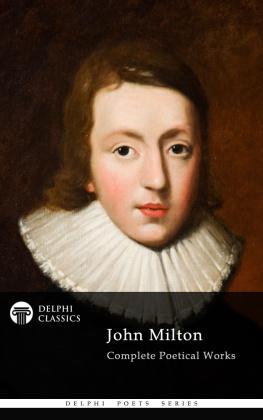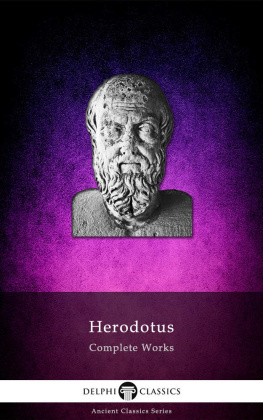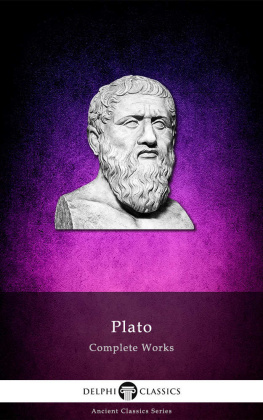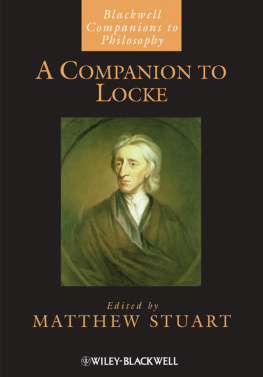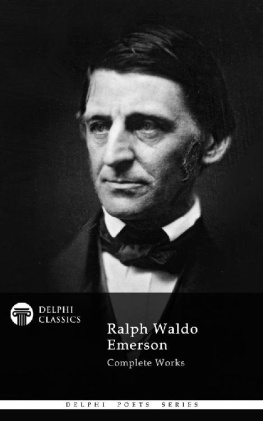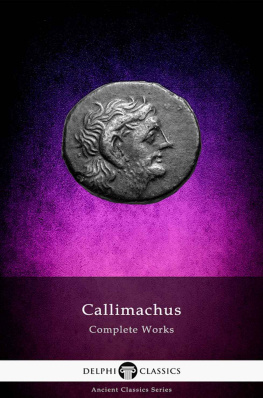John Locke - Delphi Complete Works of John Locke (Illustrated) (Delphi Series Eight Book 4)
Here you can read online John Locke - Delphi Complete Works of John Locke (Illustrated) (Delphi Series Eight Book 4) full text of the book (entire story) in english for free. Download pdf and epub, get meaning, cover and reviews about this ebook. year: 2017, publisher: Delphi Classics, genre: Science. Description of the work, (preface) as well as reviews are available. Best literature library LitArk.com created for fans of good reading and offers a wide selection of genres:
Romance novel
Science fiction
Adventure
Detective
Science
History
Home and family
Prose
Art
Politics
Computer
Non-fiction
Religion
Business
Children
Humor
Choose a favorite category and find really read worthwhile books. Enjoy immersion in the world of imagination, feel the emotions of the characters or learn something new for yourself, make an fascinating discovery.
- Book:Delphi Complete Works of John Locke (Illustrated) (Delphi Series Eight Book 4)
- Author:
- Publisher:Delphi Classics
- Genre:
- Year:2017
- Rating:3 / 5
- Favourites:Add to favourites
- Your mark:
- 60
- 1
- 2
- 3
- 4
- 5
Delphi Complete Works of John Locke (Illustrated) (Delphi Series Eight Book 4): summary, description and annotation
We offer to read an annotation, description, summary or preface (depends on what the author of the book "Delphi Complete Works of John Locke (Illustrated) (Delphi Series Eight Book 4)" wrote himself). If you haven't found the necessary information about the book — write in the comments, we will try to find it.
Delphi Complete Works of John Locke (Illustrated) (Delphi Series Eight Book 4) — read online for free the complete book (whole text) full work
Below is the text of the book, divided by pages. System saving the place of the last page read, allows you to conveniently read the book "Delphi Complete Works of John Locke (Illustrated) (Delphi Series Eight Book 4)" online for free, without having to search again every time where you left off. Put a bookmark, and you can go to the page where you finished reading at any time.
Font size:
Interval:
Bookmark:
The Complete Works of
JOHN LOCKE
(1632-1704)

Contents

Delphi Classics 2017
Version 1

The Complete Works of
JOHN LOCKE

By Delphi Classics, 2017
Complete Works of John Locke
First published in the United Kingdom in 2017 by Delphi Classics.
Delphi Classics, 2017.
All rights reserved. No part of this publication may be reproduced, stored in a retrieval system, or transmitted, in any form or by any means, without the prior permission in writing of the publisher, nor be otherwise circulated in any form other than that in which it is published.
ISBN: 978 1 78656 076 6
Delphi Classics
is an imprint of
Delphi Publishing Ltd
Hastings, East Sussex
United Kingdom
Contact: sales@delphiclassics.com
www.delphiclassics.com
Other classic Non-Fiction eBooks available

These comprehensive editions are beautifully illustrated, featuring rare works and offering eReaders some of the greatest non-fiction works ever written.
Explore Non-Fiction at Delphi Classics

Wrington, Somerset, approximately twelve miles from Bristol Lockes birthplace

John Locke was born on 29 August 1632, in a small thatched cottage by the church in Wrington.

THE SECOND EDITION TEXT
This important essay analyses the foundation of human knowledge and understanding. First appearing in 1689, the text describes the mind at birth as a blank slate, filled later through experience. Divided into four books, the essay was one of the principal sources of empiricism in modern philosophy, influencing many enlightenment philosophers, such as David Hume and George Berkeley.
The first book refutes the rationalist notion of innate ideas. Locke allows that some ideas are in the mind from an early age, but argues that such ideas are furnished by the senses starting in the womb: for instance, differences between colours or tastes. If we have a universal understanding of a concept like sweetness, it is not because this is an innate idea, but because we are all exposed to sweet tastes at an early age. One of Lockes fundamental arguments against innate ideas is the very fact that there is no truth to which all people attest.
Book II sets out Lockes theory of ideas, including his distinction between passively acquired simple ideas, such as red, sweet, round, etc., and actively built complex ideas, such as numbers, causes and effects, abstract ideas, ideas of substances, identity and diversity. Locke also distinguishes between the truly existing primary qualities of bodies, like shape, motion and the arrangement of minute particles, and the secondary qualities that are powers to produce various sensations in us such as red and sweet. These secondary qualities, Locke claims, are dependent on the primary qualities. He also offers a theory of personal identity, offering a largely psychological criterion. The third book is concerned with language and the fourth and final book considers knowledge, including intuition, mathematics, moral philosophy, natural philosophy, faith and opinion.
Many of Lockes views were harshly criticised by rationalists and empiricists alike. In 1704 the rationalist Gottfried Leibniz wrote a response in the form of a chapter-by-chapter rebuttal, titled New Essays on Human Understanding . Leibniz was critical of a number of Lockes views, including his rejection of innate ideas, his skepticism about species classification, and the possibility that matter might think, among other things. Leibniz thought that Lockes commitment to ideas of reflection in An Essay Concerning Human Understanding ultimately made him incapable of escaping the nativist position or being consistent in his empiricist doctrines of the minds passivity. The empiricist George Berkeley was equally critical of Lockes views. Berkeleys most notable criticisms of Locke were first published in A Treatise Concerning the Principles of Human Knowledge . Berkeley held that Lockes conception of abstract ideas was incoherent and led to severe contradictions. He also argued that Lockes conception of material substance was unintelligible, a view which he also later advanced in the Three Dialogues Between Hylas and Philonous . At the same time, Lockes work provided crucial groundwork for future empiricists such as David Hume.

The first editions title page

John Locke by Herman Verelst, 1689 completed the year of publication of An Essay Concerning Human Understanding

Portrait of David Hume by Allan Ramsay, 1754

Portrait of Berkeley by John Smybert, 1727
Quam bellum est velle confiteri potius nescire quod nescias, quam ista effutientem nauseare, atque ipsum sibi displicere. Cic. De Natur. Deor. 1. i.
AND MONTGOMERY, BARON HERBERT OF CARDIFF LORD ROSS, OF KENDAL, PAR, FITZHUGH, MARMION, ST. QUINTIN, AND SHURLAND;
LORD PRESIDENT OF HIS MAJESTYS MOST HONOURABLE PRIVY COUNCIL; AND LORD LIEUTENANT OF THE COUNTY OF WILTS, AND OF SOUTH WALES.
MY LORD,
This Treatise, which is grown up under your lordships eye, and has ventured into the world by your order, does now, by a natural kind of right, come to your lordship for that protection which you several years since promised it. It is not that I think any name, how great soever, set at the beginning of a book, will be able to cover the faults that are to be found in it. Things in print must stand and fall by their own worth, or the readers fancy. But there being nothing more to be desired for truth than a fair unprejudiced hearing, nobody is more likely to procure me that than your lordship, who are allowed to have got so intimate an acquaintance with her, in her more retired recesses. Your lordship is known to have so far advanced your speculations in the most abstract and general knowledge of things, beyond the ordinary reach or common methods, that your allowance and approbation of the design of this Treatise will at least preserve it from being condemned without reading, and will prevail to have those parts a little weighed, which might otherwise perhaps be thought to deserve no consideration, for being somewhat out of the common road. The imputation of Novelty is a terrible charge amongst those who judge of mens heads, as they do of their perukes, by the fashion, and can allow none to be right but the received doctrines. Truth scarce ever yet carried it by vote anywhere at its first appearance: new opinions are always suspected, and usually opposed, without any other reason but because they are not already common. But truth, like gold, is not the less so for being newly brought out of the mine. It is trial and examination must give it price, and not any antique fashion; and though it be not yet current by the public stamp, yet it may, for all that, be as old as nature, and is certainly not the less genuine. Your lordship can give great and convincing instances of this, whenever you please to oblige the public with some of those large and comprehensive discoveries you have made of truths hitherto unknown, unless to some few, from whom your lordship has been pleased not wholly to conceal them. This alone were a sufficient reason, were there no other, why I should dedicate this Essay to your lordship; and its having some little correspondence with some parts of that nobler and vast system of the sciences your lordship has made so new, exact, and instructive a draught of, I think it glory enough, if your lordship permit me to boast, that here and there I have fallen into some thoughts not wholly different from yours. If your lordship think fit that, by your encouragement, this should appear in the world, I hope it may be a reason, some time or other, to lead your lordship further; and you will allow me to say, that you here give the world an earnest of something that, if they can bear with this, will be truly worth their expectation. This, my lord, shows what a present I here make to your lordship; just such as the poor man does to his rich and great neighbour, by whom the basket of flowers or fruit is not ill taken, though he has more plenty of his own growth, and in much greater perfection. Worthless things receive a value when they are made the offerings of respect, esteem, and gratitude: these you have given me so mighty and peculiar reasons to have, in the highest degree, for your lordship, that if they can add a price to what they go along with, proportionable to their own greatness, I can with confidence brag, I here make your lordship the richest present you ever received. This I am sure, I am under the greatest obligations to seek all occasions to acknowledge a long train of favours I have received from your lordship; favours, though great and important in themselves, yet made much more so by the forwardness, concern, and kindness, and other obliging circumstances, that never failed to accompany them. To all this you are pleased to add that which gives yet more weight and relish to all the rest: you vouchsafe to continue me in some degrees of your esteem, and allow me a place in your good thoughts, I had almost said friendship. This, my lord, your words and actions so constantly show on all occasions, even to others when I am absent, that it is not vanity in me to mention what everybody knows: but it would be want of good manners not to acknowledge what so many are witnesses of, and every day tell me I am indebted to your lordship for. I wish they could as easily assist my gratitude, as they convince me of the great and growing engagements it has to your lordship. This I am sure, I should write of the UNDERSTANDING without having any, if I were not extremely sensible of them, and did not lay hold on this opportunity to testify to the world how much I am obliged to be, and how much I am,
Next pageFont size:
Interval:
Bookmark:
Similar books «Delphi Complete Works of John Locke (Illustrated) (Delphi Series Eight Book 4)»
Look at similar books to Delphi Complete Works of John Locke (Illustrated) (Delphi Series Eight Book 4). We have selected literature similar in name and meaning in the hope of providing readers with more options to find new, interesting, not yet read works.
Discussion, reviews of the book Delphi Complete Works of John Locke (Illustrated) (Delphi Series Eight Book 4) and just readers' own opinions. Leave your comments, write what you think about the work, its meaning or the main characters. Specify what exactly you liked and what you didn't like, and why you think so.










